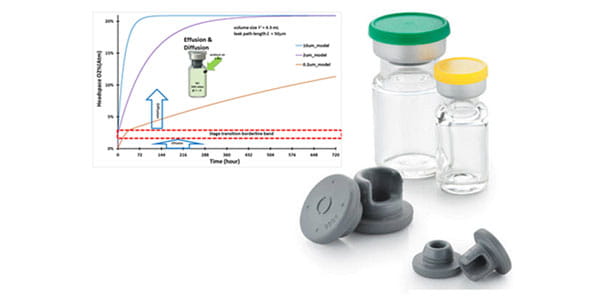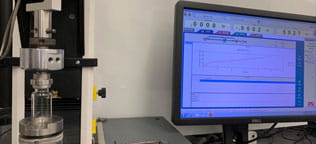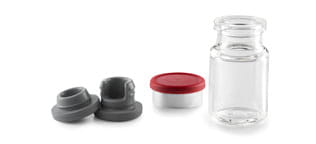Robust CCI Performance Evaluation Through a New Integrated Approach
Container closure integrity (CCI) has been a fundamental core requirement of containment and delivery solutions in the West product portfolio. Container closure systems (CCSs) must maintain both the sterility and stability of pharmaceutical products; very importantly they must be free of microbial contamination. Microbial ingress into a CCS will jeopardize product sterility.
![]()

Another consideration is gaseous ingress, such as oxygen, carbon dioxide, or moisture; these must be controlled according to the specific product requirements. Still another consideration is oxidization and pH value changes; pharmaceutical products, including biologics and cell and gene therapy products, may contain molecular structures or chemical function groups that are very sensitive to such changes. A way to promote additional protection is by filling CCS headspace with inert gas, such as nitrogen, or maintaining a vacuum. This may require a lyophilization process and subsequent measures for maintaining a certain pressure level or inert gas level over the product shelf life. Under required conditions for processing, storing, and shipping, appropriate CCS qualification for CCI performance is mandatory regulatory compliance. The regulatory requirements for CCI are both well-established and well-promulgated:
- US Department of Health and Human Services, Food and Drug Administration, Center for Drug Evaluation and Research (CDER), Center for Biologics Evaluation and Research (CBER), Guidance for Industry: Container Closure Systems for Packaging Human Drugs and Biologics; Chemistry, Manufacturing, and Controls Documentation; Rockville, MD, May 1999.
- US Pharmacopeia, General Chapter <1207> Package Integrity Evaluation Sterile Products. USP 39 –NF34, Suppl. 1., Rockville, MD, 2016
- European Commission, Annex 1, Manufacture of Sterile Medicinal Products of the Eudralex Volume 4 for Consultation.
- ICH Harmonized Tripartite Guideline, Quality of Biotechnological Products: Stability Testing of Biotechnological/Biological Products: Q5C. November 1995.
In parenteral drug packaging, some CCS types may display very low leakage through the gaps that exist, even between well-fitted components. However, a CCS must not permit leakage beyond a drug product maximum allowable leakage limit (MALL) in order to maintain sterility. As noted above, many drug products are sensitive to oxygen, carbon dioxide, or moisture. For example, the drug stability may be affected by a certain amount of oxygen, even when the oxygen ingress is very slow. This makes CCI testing more important, and in some cases more difficult and complicated. As a result, there has been a challenge for properly establishing and applying CCI evaluation methods in parenteral drug packaging. More specifically, a given type of testing technique may be inadequate due to many factors including: a) setup under very specific testing conditions; b) destructive methods that do not occur under real world conditions; c) inability to iterate testing on same sample to identify trend due to destructive method; d) lengthy testing that is time consuming to identify trending resultants from slow leakage; e) issues with representative sampling; and f) resulting inability to reproduce and predict results for various real-world applications. To address these shortcomings, a well-designed modeling approach can provide both a more systematic understanding and more consistent prediction of CCI performance.
Fundamentally, any potential CCS leakage can be described as a molecular flow through a leak path under specific conditions. This can result in either ingress or egress from the CCS. This molecular flow can be due to diffusion and/or mass/volumetric flow. Given that these two flow types are driven by different physical forces, their flow rates are very different. Molecule diffusion depends on the molecule concentration differential, where molecules flow from a high concentration area to a low concentration area. Mass/volumetric flow depends on total pressure differential, where molecules are forced and flow from a high-pressure area to a low-pressure area. Molecule diffusion can occur without mass/volumetric flow in the case where a total pressure equilibrium exists (i.e., there is no pressure differential), or it can occur simultaneously with mass/volumetric flow. Fundamentally, the dynamic nature of molecular flow means that CCS leakage and CCI are time dependent.
West is committed to the safe and efficient delivery of drug products to patients, and as such is continually focused on developing new and enhanced methods to evaluate product performance. A new work on understanding molecular flow has just been published: A New Integrated Modeling Approach with Case Studies for Gas Transmission of Container Closure Headspace by Dr. Qingyu Zeng in the PDA Journal of Pharmaceutical Science and Technology (April 2021). This paper presents a new integrated approach, that is an innovative and powerful tool for CCI evaluations. It accounts for both diffusion and mass/volumetric flow in real-time seamlessly, and can solve problems arising from real world applications. This modeling approach is based on the law of conservation and continuity for molecular flow, Fick’s law of diffusion, and the Darcy-Weisbach theory of frictional mass/volumetric flow. It provides solutions solved by numerical methods for real world applications. This approach has demonstrated its capability and versatility for CCI control strategies including complicated CCI scenarios in practical cases for advanced applications in biologics and cell and gene therapies. For example, for CCS lyophilized under vacuum and then filled with nitrogen, this approach is able to clearly reveal that oxygen ingress enters in two phases, starting with effusion and continuously followed by diffusion in a seamless dynamic transition. It is capable to calculate and capture exact timing of the phase transition point providing a unique understanding of complicated CCS problems.
A strong modeling approach is an important part of any CCI control strategy. It can be a powerful tool for working-smart that provides data-driven insight into CCI as well as a solid foundation for CCI test method development and validation for CCI performance. This is critical for determining whether the CCS conforms to product requirements, and making informed decisions accordingly for risk mitigation. Ensuring good CCI is essential for a CCS. This modeling approach is an example of West's commitment to the safe and efficient delivery of drug products to patients.
For more on how West can provide support, please contact an Account Manager or Technical Customer Support (TCS) representative.












